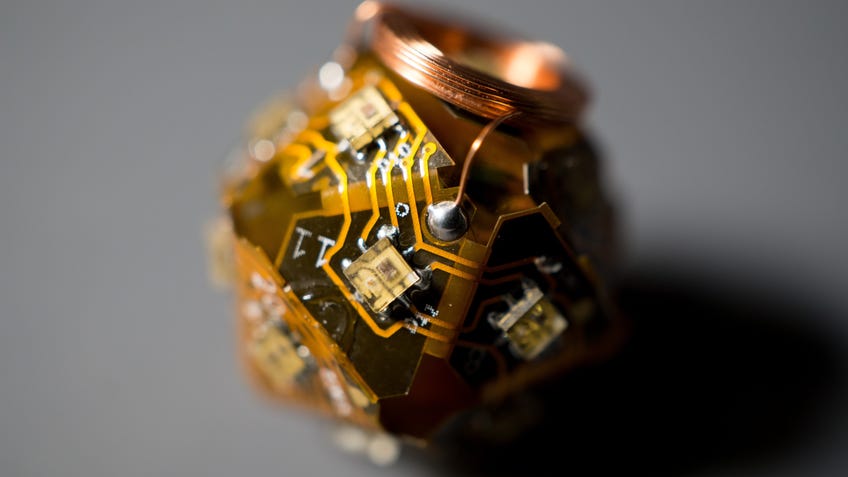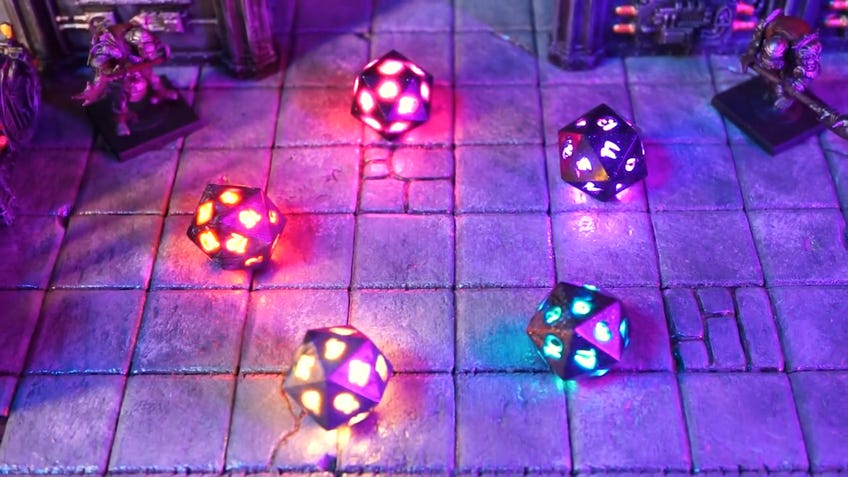Pixels’ electronic, Bluetooth-enabled dice bring the physical heft back to digital adventures
Be the RGB-lit envy of the table.
The inexorable march of technology in the last few years can easily be marked by humanity’s ability to stuff RGB LEDs and electronics in as many unassuming items as possible. With the introduction of Pixels, your personal set of polyhedral peripherals is next on the block of progress.
Pixels, the creation of electrical engineer Jean Simonet, promises to do more than light up: the tech-stuffed dice come with Bluetooth connectivity, programmable lights and maintain a weight and balance comparable with other popular brands.
The Kickstarter campaign for Pixels smashed through its initial goal of $200,000 within six minutes and - at the time of writing - is currently sitting at more than $1,700,000 pledged by folks enamoured by the idea of smart dice. It’s not hard to imagine why: digital RPGs have ballooned over the past years as tabletop groups in the midst of a pandemic found themselves faced with indefinitely postponing campaigns or moving Dungeon & Dragons night online.
While apps like Roll20 and Digital Foundry make that transition fairly seamless and even more efficient, key presses will never replace the feeling of a d20 in hand before an attack roll, or the suspenseful clack of resin on wood as the entire table waits for the result. Pixels presents itself as the compromise: smart dice you can roll and have the results populated on the platform of your choice.
The Kickstarter description claims Pixels have been designed to mimic bog-standard dice in as many ways as possible. All of the included electronics put their weight closer to metal-cast dice, but the company claims their results don’t differ from brands like Chessex and performed admirably in stress tests. These dice can weather drops from the table, jostling in your bag and even the occasional dunk in a glass of water.
Pixels’ effects come from a series of LEDs embedded in the dice and can be fully programmable using its proprietary software and accompanying app. They can be charged wirelessly by setting them inside an admittedly cute little pod that connects to a normal outlet or USB port. A one-hour charge delivers roughly five straight hours of light effects and Bluetooth connectivity, while disabling the optical effects will boost its life expectancy considerably.

Pixels is offering an optional large charging case, about the size of a pencil bag, that can charge a full set of dice three or four times before needing to be refuelled itself. Plus, it doubles as handy storage that fits in a purse or backpack.
Simonet claims both Roll20 and Digital Foundry have agreed to support Pixels’ connection, allowing players to sync their Bluetooth-enabled dice to the browser-based tabletop service and populate the results there. A video on the campaign page shows Roll20 automatically applying stat bonuses and other modifiers once the die was thrown. Pixels hopes to also clinch compatibility with D&D Beyond and Fantasy Grounds in the near future.
Those interested in a set of smart dice can choose between four different resin colours and a clear option, which shows off all the electrical guts. Pixels aren’t cheap, though: a full set of seven dice - which you can mix and match from d4s all the way to d100 percentiles - runs $219 (£158) and individual pieces cost $39 (£28) each.
The Kickstarter campaign for Pixels will run through April 8th, with shipping to backers estimated to begin in March of 2022.

